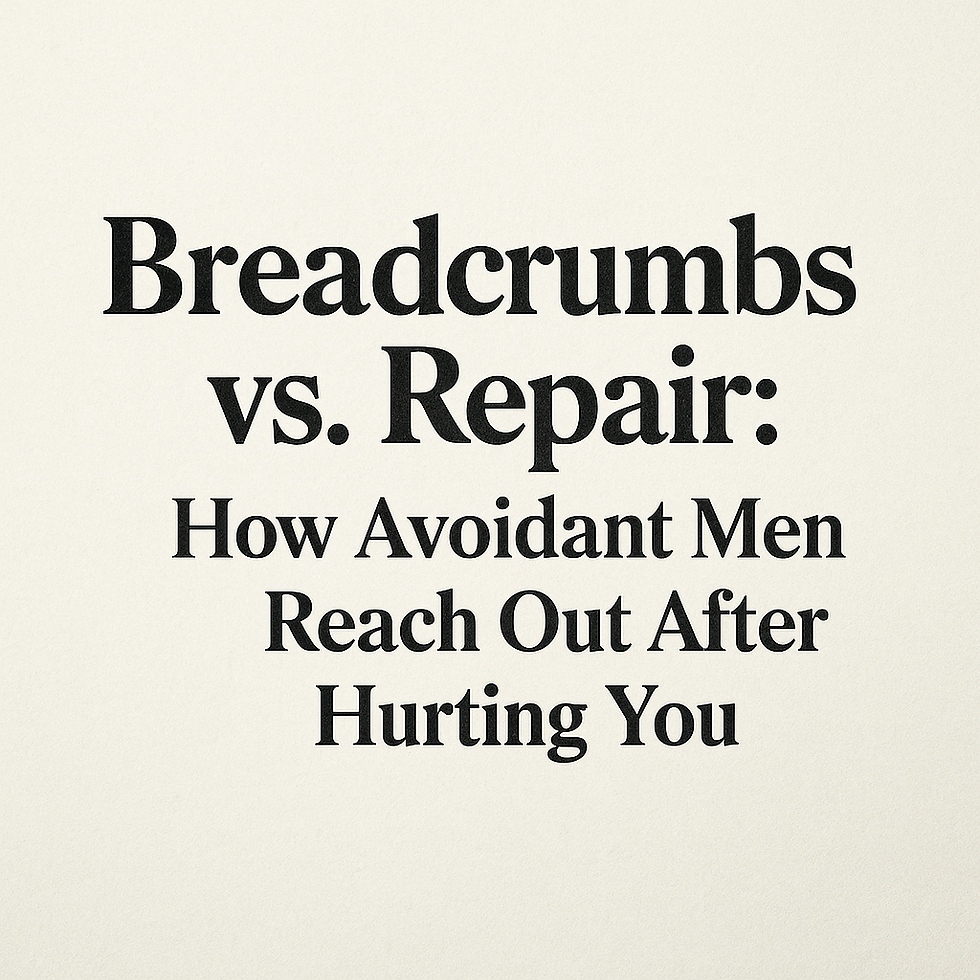The Invisible Wound: How Emotional Neglect Fuels Narcissistic Abuse
- Jessica Hopkins
- Jul 17
- 4 min read
Updated: Sep 11

Emotional neglect doesn’t leave scars you can see, it leaves questions. Why wasn’t I enough? Why did I stay? Why does this still hurt?
For many survivors of narcissistic abuse, emotional neglect is the underlying pattern that made them more susceptible to the manipulation, gaslighting, and trauma bonds that followed. It teaches you to expect less, to accept crumbs, and to doubt your right to emotional safety.
In this blog, we explore what emotional neglect is, how it often starts in childhood, and why it’s a powerful thread in the cycle of narcissistic abuse.
What Is Emotional Neglect?
Emotional neglect is the absence of emotional validation, support, and responsiveness from those who were supposed to care for you. Unlike emotional abuse, which is active harm, emotional neglect is often passive but just as damaging.
It sounds like:
“You’re too sensitive.”
“Stop crying or I’ll give you something to cry about.”
“You’re fine.”
Or sometimes… it sounds like nothing at all. Silence. Dismissal. Absence.
Neglect teaches you that your feelings are a burden. That your needs are unimportant. That being “low maintenance” is something to be proud of even when it costs you your emotional well-being.
How Emotional Neglect Ties Into Narcissistic Abuse
Many women who end up in narcissistic relationships come from homes where emotional neglect was normalized. When your feelings weren’t nurtured or protected early on, you may not develop:
A strong internal sense of worth
Healthy boundaries
The ability to recognize red flags
A belief that you deserve emotional reciprocity
So when a narcissist love-bombs you, mirrors your needs, and promises to fill that emotional void, it feels like finally being seen. Until the emotional unavailability resurfaces… only now, it’s coupled with control, gaslighting, and manipulation.
Signs of Emotional Neglect in Childhood (That Often Go Unnoticed)
You were expected to “be strong” and hide emotions
Your achievements were noticed, but not your struggles
You were often left to soothe yourself
Your caregivers focused on physical needs but ignored emotional ones
You felt invisible unless you were performing, pleasing, or fixing
How Emotional Neglect Makes You Vulnerable to Narcissists
Here’s what often happens:
Emotional Neglect | Narcissistic Abuse |
You learned to self-abandon to keep the peace | You tolerate emotional withdrawal or stonewalling |
You crave validation you never received | You become hooked on love-bombing |
You learned to earn love through people-pleasing | You feel responsible for “fixing” the narcissist |
You’re uncomfortable with your own emotions | You’re easily gaslit into thinking your pain is overreacting |
Emotional neglect primes you to accept relationships where your emotional reality is minimized, distorted, or outright ignored.
My Story
Growing up, I didn’t have a name for emotional neglect. I just thought I had to be “low-maintenance” to be lovable. When I cried, I was told to toughen up. When I was hurt, I was expected to brush it off. So years later, when I found myself in a relationship where I was dismissed, ignored, and told I was “too much”, it felt… familiar. I confused control with care. I mistook emotional withdrawal as something I caused. I over-explained, over-apologized, and kept trying to earn love. But what I know now is this:
If you were neglected, you may have grown up believing that love is something you earn by proving you're worth being kept. It's not. Real love doesn’t require you to beg, perform, or convince, it sees you, values you, and chooses you freely.
Healing From Emotional Neglect
The first step is awareness. The second is permission to feel, to need, to be human.
Here’s how you start healing:
Name it. Acknowledge that emotional neglect is a form of harm.
Speak your needs. Practice identifying and expressing what you feel and need without guilt.
Break the pattern. Choose relationships where emotional safety is mutual, not earned.
Build boundaries. You are allowed to protect your peace, your feelings, and your space.
Reparent yourself. Offer yourself the love, attention, and tenderness you never received.
Why This Awareness Matters
If you’ve been in a narcissistic relationship, there’s a good chance that emotional neglect came first whether from family, early relationships, or society’s messages. Naming this pattern is not about blame, it’s about liberation. The more you understand the why, the more empowered you become to change the what now.
Want to Go Deeper?
Join The Power Collective: Healing Through Community and Support
If this blog resonated with you, consider reading:
Adult Children of Emotionally Immature Parents by Lindsay C. Gibson
This powerful book helps uncover the lasting impact of emotional neglect in childhood and offers practical tools for healing and setting boundaries in adulthood.
Final Note
You deserve to be emotionally supported, not just tolerated. You are not too sensitive. You are not too needy. You are not hard to love. You just weren’t given the emotional care you needed, but that doesn’t define what you deserve now. Healing begins when you stop dimming your light to survive and start reclaiming your right to feel, speak, and be whole.
You are not alone. And you never were.




Comments